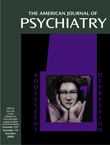Psychological Defense Styles and Childhood Sexual Abuse
To the Editor: The article by Sarah E. Romans, M.D., F.R.A.N.Z.C.P., et al. (1) is a valuable contribution to the literature on the effects of childhood traumatic experiences. As the authors noted, very few investigations have studied a nonclinical population.
This study found that childhood sexual abuse—even including intercourse—was not related to higher levels of dissociation. This conclusion should be understood in a larger context. Our findings (2, 3) suggest that early onset and chronicity of childhood trauma are related to the development of dissociation, and the current study did not address these factors. On a theoretical basis, some younger children are believed to have a high capacity to dissociate and maintain that high level only through repeated traumatization. In a community population with relatively low levels of psychiatric illness or disability, one might suspect that many women who were sexually abused suffered relatively limited abuse, for which they may have compensated. In clinical populations one would be more likely to find the types of psychological damage (perhaps including dissociation) that result from chronic traumatization beginning at an early age.
Despite its limitations, this study is an important first step. It is critical to study nonclinical populations to determine what psychiatric problems develop from what kind of life experiences. Just as important, it must be determined what protective mechanisms exist that may protect traumatized children from suffering ongoing psychological damage from their experiences.
1. Romans SE, Martin JL, Morris E, Herbison GP: Psychological defense styles in women who report childhood sexual abuse: a controlled community study. Am J Psychiatry 1999; 156:1080–1085Google Scholar
2. Kirby JS, Chu JA, Dill DL: Correlates of dissociative symptomatology in patients with physical and sexual abuse histories. Compr Psychiatry 1993; 34:258–263Crossref, Medline, Google Scholar
3. Chu JA, Frey LM, Ganzel BL, Matthews JA: Memories of childhood abuse: dissociation, amnesia and corroboration. Am J Psychiatry 1999; 156:749–755Abstract, Google Scholar



